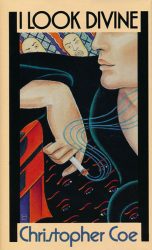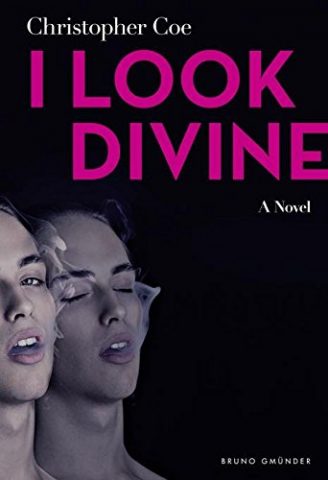 I Look Divine
I Look Divine
by Christopher Coe
Published by Ticknor & Fields
Published July 28, 1998
Fiction
109 pgs. • Find on Amazon.com
Reviewed by Stephen O. Murray
November 2, 1999.
My copy of Christopher Coe’s I Look Divine was previously owned by someone French (at least there is a beginning and an end date in “mars” of 1989). This seems highly appropriate, since the book is a récit.
The narrator is the less brilliant, less beautiful of a pair of affluent gay brothers whose parents died young. The extraordinary one is dead at 37. I assumed he died of AIDS, but was wrong. The surviving brother looks at “shots” including a life-size one of his brother atop a Chichen Itza pyramid and looks through his brothers possessions, many of them tributes from older men when Nicholas was young and gorgeous (not to mention pretentious and narcissistic to the edge of madness).
The never-named narrator was often appalled but still mesmerized by his younger brother, and bewildered by the extinguishing of Nicholas’s life and the debris of it that evokes the memories that are the text. (I think the reader does not need to know anything more about the narrator than what his voice and memories reveal.) The prose is exquisite, and frequently very funny, although the book is an elegy, not a comedy (social or psychological) about someone deadly serious about the cult of youth and beauty.
Before Coe died (of AIDS), at the age of 41, in 1994 he wrote a sprawling novel unlike the hard, lucid (gemlike) I Look Divine titled Such Times, but one that was also built on flashbacks.
Nicholas wonders “who are people trying to fool, when they go through their lives acting just like themselves” (52)—though it could easily be argued that he did himself, accepting tributes until 30 and then paying for what he could no longer be (young and perfect) since “one person must be amazed to be with the other” (100).
Reading the foreword that Jean Cocteau wrote for Roger Peyrefitte’s 1959 novel The Exile of Capri,the following attempt to exorcize the solipsism of youthful arrogance struck me as a corrective to Nicholas’s self-annihilating belief system:
“Youth is an ephemeral privilege, not the attribute of a separate, hardy race setting itself up in opposition to the decaying race of the old.”
(Cocteau was old when he wrote this and the “youth generation” had not yet attained group consciousness… or reached high school… and is now not just aging but aged…)
2 November 1999, later published on associated content
©1999, 2016, Stephen O. Murray


